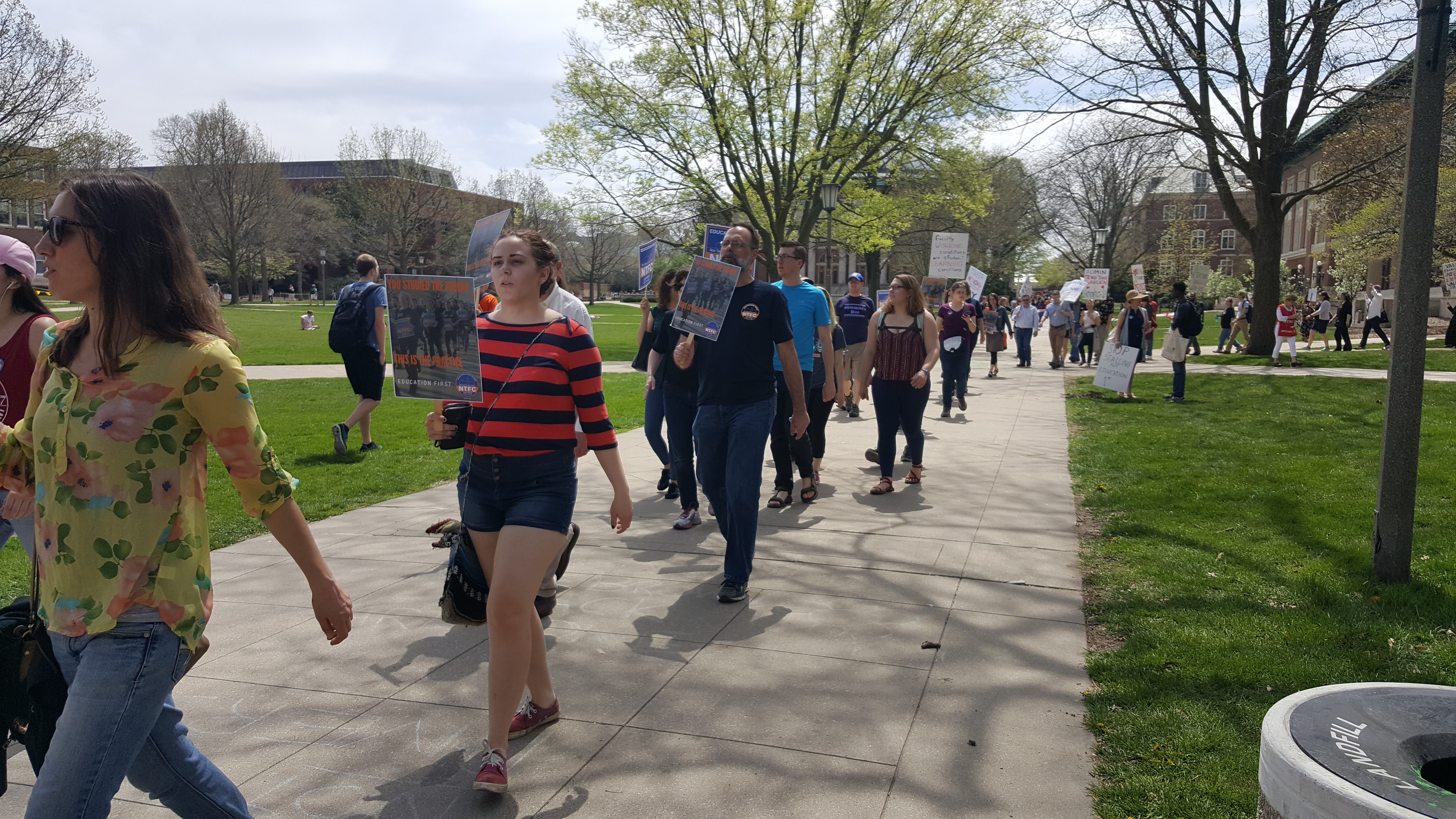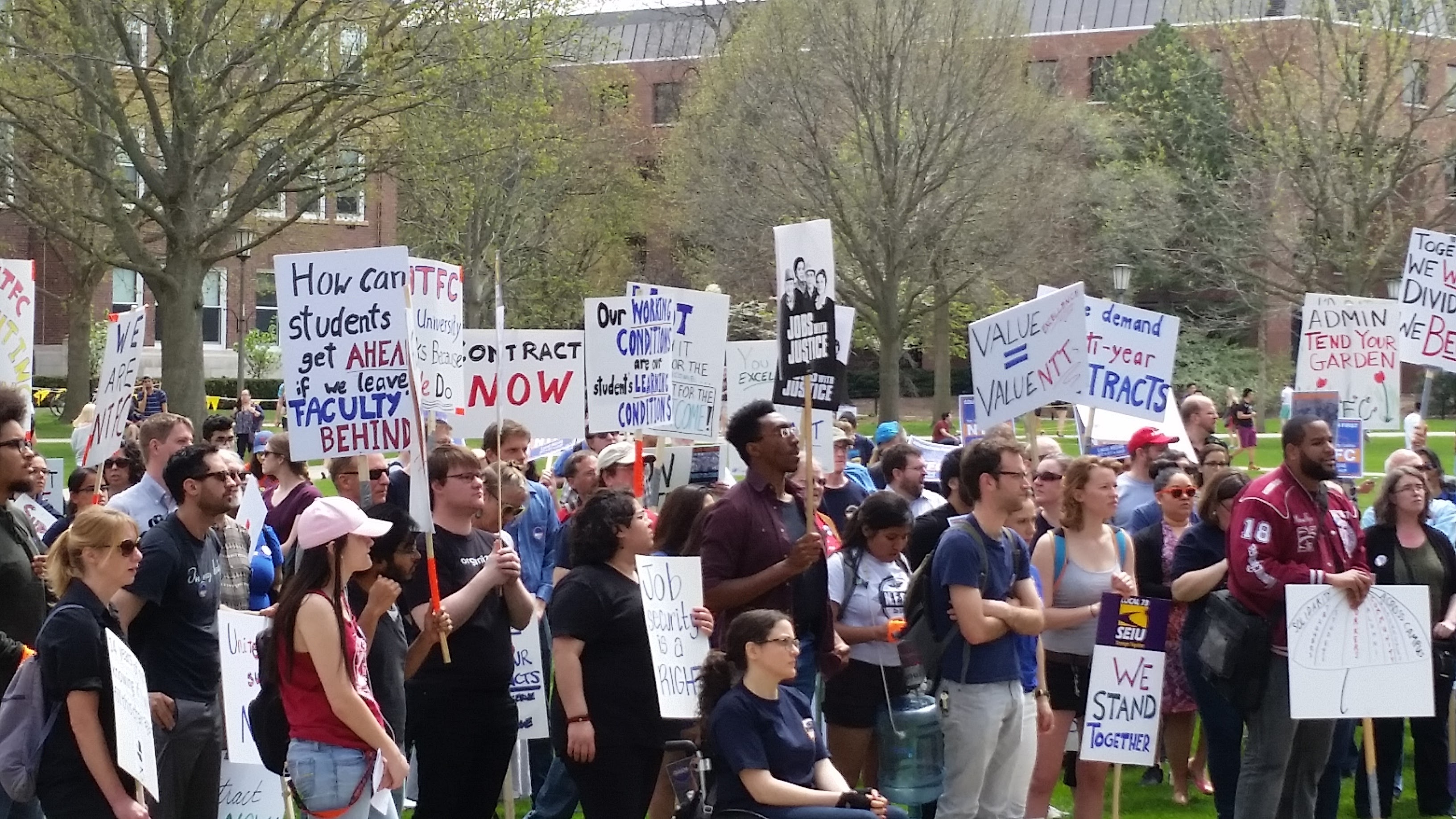For the last nineteen months, NTFC Local #6546, the union that represents about 500 non-tenure-track faculty at the University of Illinois at Urbana-Champaign, fought for our first contract. When we started bargaining, in October 2014, we heard from our colleagues and union comrades that such a fight would be a slog, that the University would resist our efforts and slow the pace of bargaining, and that we might eventually have to decide when and why we would go on strike to see our demands met. They were right—we did encounter roadblocks in bargaining, and we did have to ask our members when and why they would be willing to strike. And strike we did. It was the only way to win a contract whose terms met our members’ demands.
If you follow local news, you most likely know that NTFC struck for two days in a pre-announced strike on April 19 and April 20, then began a five-day strike on April 28 that would have encompassed the five remaining class days of the semester. After two days of that second strike, we were finally able to settle a collective bargaining agreement, our first, with firm protections for long-term employment and a better system of appointment and reappointment. Further, we secured clearer language on academic freedom and governance, while also raising the salary floor for those in our unit on the lower end of the pay scale over the next few years. But we couldn’t have gotten these results without action.
During our first two-day strike, I stood on a bench in front of the English Building—the building I work in every day—and reminded our members, solidarity partners, gathered students, and community members of the difference between rhetoric and action. The previous day, the University’s Interim Chancellor and Interim Provost had sent out a massmail to the entire campus community alleging that several “key” provisions had been settled in our negotiations, and implying that we weren’t giving the mediated bargaining process a fair chance. I stood to counter these assertions, noting that none of our true “key” concerns had been settled, and that our actions demanded a response. I called for direct action in response to ours. Instead of a 600-word massmail, we wanted something of substance: administrative involvement in our bargaining to move things forward.
And yet, none was immediately forthcoming. We were promised that at the next bargaining session (a week later), we might see movement. So, we chose another form of action, a work-in, first outside the Henry Administration Building, then outside the President’s office, to demonstrate what our labor looks like. Faculty met with students, graded papers, prepared lessons. A lot of us had work to catch up on, after our two-day strike. To his credit, President Killeen was cordial and met with some of our members, but would not commit to involvement with our contract negotiations.
So, we asked our supporters to contact the Chancellor and Provost, urging them to take our concerns seriously. And importantly, these forms of pressure complemented our work actions. A unit of our size, even with many of its members on picket lines at any given moment, cannot do it alone. Our brothers and sisters from partner unions like SEIU, AFSCME, AFL-CIO, CFT, GEO combined their efforts with the Campus Faculty Association, state-wide support from other Illinois Federation of Teacher locals and officers, as well as faculty support from many other universities, including University of Illinois at Chicago and at Springfield. All of these supporters, on the line, via phone and email, on facebook, with solidarity donations, and most important, with conviction, helped us win.
By the last three mediated bargaining sessions, it was clear that the tide was turning in our favor. Key administrators, including the Interim Provost and an Associate Provost attended bargaining, and proved instrumental in the substantive discussions that led to our final agreement. But, to be clear, we still had to strike a second time. Our members chose to do so after a full day of bargaining that led to no new results. I convened a membership meeting to ask them how to proceed—the vote was overwhelmingly in favor of a second strike, which we began the next morning, April 28.
And, then, on April 29 and April 30, we finally hashed out the remaining issues of the contract. The implication of this pattern is clear: only by direct actions and indirect pressure were we able to force movement. The long final bargaining session, on April 30 was really the first day in which we had an audience for our issues. Before then, it had been months of the administration saying it was “not interested” in our core issues or denying the provisions we put forward to try to address issues of stability and professionalism. We even brought forward language from the University of Illinois at Chicago non-tenure-track faculty contract and were told that while it might suffice in Chicago, it would not work here. And yet, though our contract differs from UIC’s in some key ways, we were finally able to see issues like long-term employment protections addressed. What had changed?
It’s clear that none of this would have been possible without direct action—strikes and pickets—and indirect support, in the form of pressure from all angles. These pieces only work in combination, and no one action was directly responsible for our success. We owe a great deal to our partners and their efforts. They were there for us and we will be there if and when the time comes. Solidarity and action are what forces movement at the bargaining table, but it can be done. And now, as we move into implementing our first collective bargaining agreement, we stand ready to help the next of us down the line. Action does lead to results.

Shawn Gilmore is a Lecturer in the Department of English at the University of Illinois, Urbana-Champaign and President of the Non-Tenure Faculty Coalition (NTFC) Local #6546, a union representing nearly 500 non-tenure-track faculty at the University of Illinois, affiliated with the American Federation of Teachers (AFT), Illinois Federation of Teachers (IFT), and the American Association of University Professors (AAUP).
[Caption 1st photo: Photo by Susanne Donovan]
[2nd photo: use as cover photo of issue. If want a caption: NFTC faculty on strike]
[Caption 3rd photo: Photo by Deneen Pajeau]



